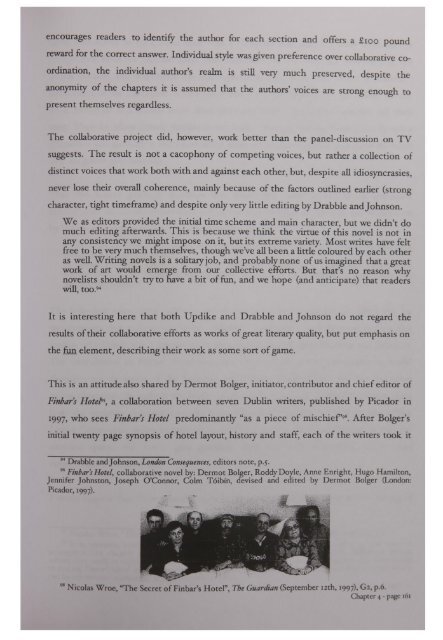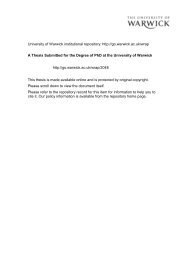From Page to Screen - WRAP: Warwick Research Archive Portal ...
From Page to Screen - WRAP: Warwick Research Archive Portal ...
From Page to Screen - WRAP: Warwick Research Archive Portal ...
You also want an ePaper? Increase the reach of your titles
YUMPU automatically turns print PDFs into web optimized ePapers that Google loves.
encourages readers <strong>to</strong> identify the author for each section and offers a £100 pound<br />
reward for the correct answer. Individual style was given preference over collaborative co<br />
ordination, the individual author's realm is still very much preserved, despite the<br />
anonymity of the chapters it is assumed that the authors' voices are strong enough <strong>to</strong><br />
present themselves regardless.<br />
The collaborative project did, however, work better than the panel-discussion on TV<br />
suggests. The result is not a cacophony of competing voices, but rather a collection of<br />
distinct voices that work both with and against each other, but, despite all idiosyncrasies,<br />
never lose their overallcoherence, mainly because of the fac<strong>to</strong>rs outlined earlier (strong<br />
character, tight timeframe) and despite only very little editing by Drabble andJohnson.<br />
We as edi<strong>to</strong>rs provided the initial time scheme and main character, but we didn't do<br />
much editing afterwards. This is because we think the virtue of this novel is not in<br />
any consistency we might impose on it, but its extreme variety. Most writes have felt<br />
free <strong>to</strong> be very much themselves, though we've all been a little coloured by each other<br />
as well. Writing novels is a solitary job, and probably none ofus imagined that a great<br />
work of art would emerge from our collective efforts. But that's no reason why<br />
novelists shouldn't try <strong>to</strong> have a bit offun, and we hope (and anticipate) that readers<br />
will, tOO. 94<br />
It is interesting here that both Updike and Drabble and Johnson do not regard the<br />
results oftheir collaborative efforts as works ofgreat literary quality, but put emphasis on<br />
the fun element, describing their work as some sort ofgame.<br />
This is an attitude also shared by Dermot Bolger, initia<strong>to</strong>r, contribu<strong>to</strong>r and chief edi<strong>to</strong>r of<br />
Finbar's Hotei", a collaboration between seven Dublin writers, published by Picador in<br />
1997, who sees Finbar's Hotel predominantly "as a piece of mischief?". After Bolger's<br />
initial twenty page SYnopsis of hotel layout, his<strong>to</strong>ry and staff, each of the writers <strong>to</strong>ok it<br />
94 Drabble andJohnson, London Consequences, edi<strong>to</strong>rs note, P.5.<br />
95 Finbar's Hotel, collaborative novel by: Dermot Bolger, Roddy Dorle, Anne Enright, Hugo Hamil<strong>to</strong>n,<br />
Jennifer Johns<strong>to</strong>n, Joseph O'Connor, Colm Toibfn, devised and edited by Dermot Bolger (London;<br />
Picador, 1997).<br />
e Nicolas Wroe, "The Secret of Finbar's Hotel", The Guardian (September rzth, 1997), G2, p.6.<br />
Chapter 4 - page 161





